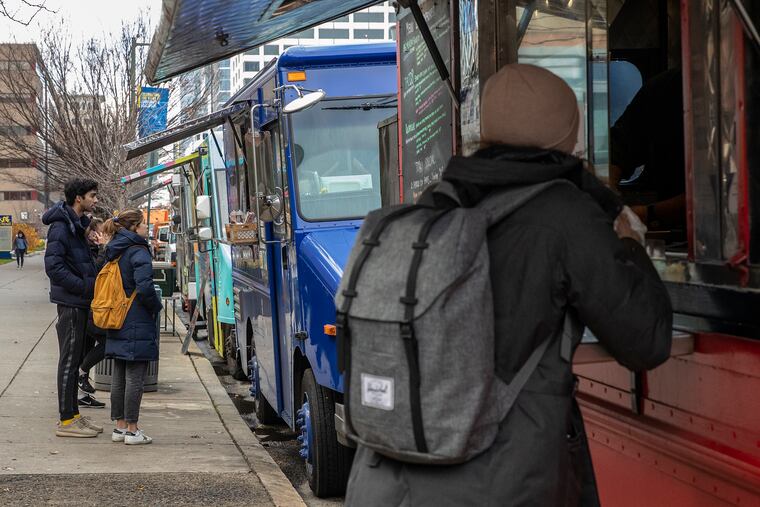Cities should stop driving away food trucks | Editorial
Food trucks are popular. But some people in cities like Camden and Philly don't like them. How should communities balance the competing interests of mobile and bricks-and-mortar food vendors?

The days when Philadelphia street cuisine consisted of hot dogs, pretzels, and ice cream are history. The “roach coaches” of legend have given way to a cornucopia of curbside food trucks, many offering creative cookery and international flavors. But while there’s relative calm, for now, between advocates for bricks-and-mortar dining and champions of mobile food vending in Philly, the situation in Camden would give anyone heartburn.
In a city that has long lacked conventional supermarket options, is often branded a “food desert,” and has in recent years provided the rationale for $1.6 billion in state tax breaks for big corporations, the entrepreneurial, often immigrant-powered, and startup-friendly food truck business is banned except for special events. Yes, you read that right. Camden doesn’t allow food trucks to operate except with one-day permits, and thus has so far missed out on a revolution that’s been adding vitality to urban America for over a decade and has become an economic engine for individuals and communities.
But if there’s reason for the ‘Can Food Trucks Find a Home in Camden?’ headline on a local news website this week, there’s also room for hope. Mayor Francisco ‘Frank’ Moran says he is working to amend the ordinance that governs on-street vending, and plans to make all of Camden welcoming to food trucks willing to meet permitting standards. The Cooper’s Ferry Partnership, the organization behind the wave of park renovations and other infrastructure improvements citywide, also supports the move.
Moran says the city can support conventional restaurants — the number has grown in recent years, particularly in East Camden — while letting food trucks serve the growing workforce downtown. Many of those potential customers are working in Camden due to the tax breaks received by their employers, so this is all the more reason to leverage these controversial incentives to create opportunities (like getting into the food truck business) for Camden residents. And with so many downtown blocks devoid of buildings and lined with parking lots would-be restaurant operators may find a food truck a good way to get started. That’s why Camden should do more than just allow, but find ways to foster these businesses.
As Camden gets ready to revise its regulations and open up food options and business opportunities, it should take note of Philadelphia’s experience. Philly has 237 licensed food trucks but bars them from certain streets including Broad Street south of Vine, and has designated vending districts in Center City, University City, and Temple University. Last year, City Council member Brian O’Neill’s bill to ban food trucks in his Northeast Philly district succeeded, although a separate ban, to make a stretch of Market Street near Drexel University off-limits was pocket-vetoed by Mayor Jim Kenney.
Camden’s decision goes well beyond whether to allow food trucks citywide. It should encourage creative solutions that will bring both social and economic benefits to the city and its residents. The industry is one of the best performing segments in the food service sector, according to Food Truckr, a wesbsite created for operators. It’s time for Camden, and Philly, to figure out how best to benefit from this fresh gastronomic and economic energy.